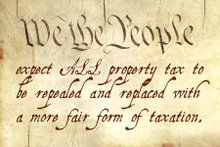Homeowners around the country are up in arms over the amount of property taxes on houses that have plummeted in value.
In some cases, the trouble is caused by property-tax assessments that lag behind the real-estate market by several years. Other disputes are caused by homeowners who believe that the national housing slump should automatically mean a lower tax bill for their home.
Valuations in many areas -- which are generally based on sales prices and a physical review -- are performed every few years, or even more infrequently, so recent changes in home prices may not be reflected in tax bills. Even in areas where assessments are done annually, there is a higher-than-usual degree of agitation.
Logan County, Ohio, for example, has seen an unprecedented wave of challenges to tax bills that went out in January. The county, which includes posh waterfront real estate, is facing about 100 more appeals this year than before, according to Michael Yoder, the county auditor. Waterfront-property assessments rose 49%; elsewhere around the county, they rose from 10% to 20%.
"I had two death threats," says Mr. Yoder, "and one gentleman who tried to punch me."
Many states have provided relief with limits on property taxes, rebates or other measures, says Harley Duncan, former executive director of the Federation of Tax Administrators. But as the housing market continues to struggle, some people are stuck paying more taxes on an asset that is sinking in value.
Overall property values in Sarasota County, Fla., for instance, have dropped 15% since last year, probably the largest decline in the county's history, according to Jim Todora, its property appraiser. All 67 counties in Florida are assessed annually, Mr. Todora says, but that doesn't prevent agitation when the market falls off sharply.
Appealing a property-tax assessment isn't terribly difficult and doesn't require a lawyer. Generally, about 90% of challenges are settled through discussions with the tax assessor's office, and only a fraction go through a formal appeal process. This math may shift, however, if the current wave of challenges continues.
Red flags for an inflated tax bill include neighboring homes that stay on the market for longer than usual or a large number of houses for sale in a particular area.
Residents of many communities have 30 to 60 days to challenge; the short time frame is intended to protect the municipality from too many challenges, according to Joel Marcus, a senior partner at Marcus & Pollack, a New York law firm that specializes in property taxes.
When challenging an assessment, it is important to come up with a price you think is fair and not just pick a number out of the air, says Gus Kramer, the tax assessor for California's Contra Costa County. He suggests checking with a local real-estate agent and estimating whether a home's assessed value matches the current market value.
The next step is to gather evidence supporting your argument. Proof may include documents that show the sales prices of nearby homes that sold around the same time as the assessment. Many property-tax records are public, so homeowners can find out how other homes are valued.
It is good to keep in mind that an assessment is just an opinion. Some assessors get too stubborn about their valuations, according to Mr. Kramer, who said that his toughest negotiations have been not with homeowners but with staff members who are too inflexible in the face of solid evidence from a homeowner.




1 comment:
"Red flags for an inflated tax bill include neighboring homes that stay on the market for longer than usual or a large number of houses for sale in a particular area."
There are 10 homes for sale on Pennsylvania Street between 40th and 54th. One on the corner of 54th has been for sale for at least a year and a half, with "Price Reduced!" posted on two separate occasions. Sound like a red flag to you?
Post a Comment